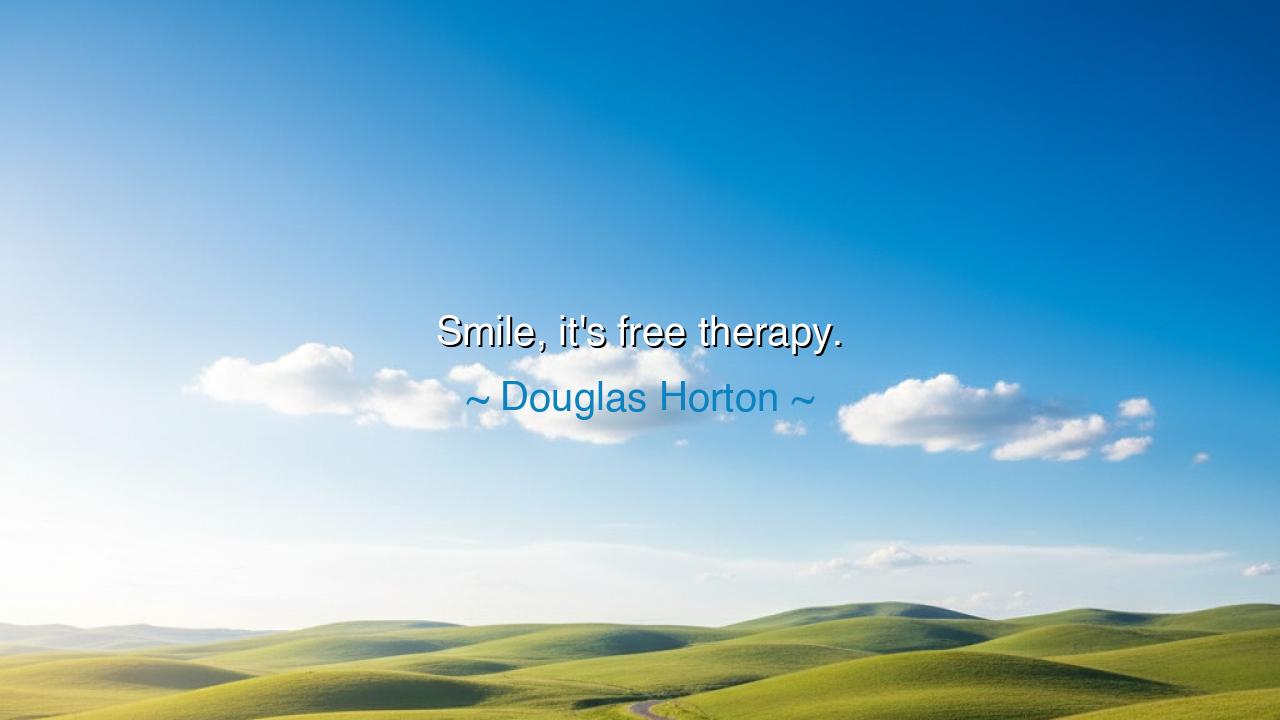
Smile, it's free therapy.






The words of Douglas Horton—“Smile, it’s free therapy.”—are simple, yet they shine with the brightness of ancient wisdom clothed in modern speech. In these few syllables lies a profound truth: that the human soul carries within itself the power of healing, and one of its most potent medicines is the smile. It costs nothing, yet it yields wealth beyond measure. It requires no physician, yet it soothes the wounded heart. It is a therapy freely available to all, and yet too often neglected.
The ancients would have said that the smile is the medicine of the spirit. Long before doctors wrote their scrolls or healers mixed their herbs, men and women knew that joy restored strength to the weary. A smile is both outward gesture and inward flame; it lifts the countenance, lightens the heart, and sets the spirit upon a higher path. Horton’s words remind us that, unlike costly cures, this therapy asks for no coin and is available at every moment. All it requires is the will to turn the face toward light, even in times of shadow.
History bears witness to this truth. Consider the example of Viktor Frankl, survivor of the concentration camps and author of Man’s Search for Meaning. Surrounded by despair, disease, and death, he discovered that even in the harshest conditions, the human spirit could endure through meaning and hope. In his memoir, he recalls prisoners who, though starved and broken, still managed to smile—at a memory, at a sunset, at a kind word shared in secret. Those fleeting smiles became lifelines, small acts of therapy that kept the soul alive when the body was near collapse. It was not wealth or medicine that saved them, but the inner fire that a smile ignited.
Horton’s insight also speaks to the power of smiling not only for oneself but for others. When we smile, we extend healing beyond our own hearts; we become physicians of joy to those around us. A smile can disarm anger, soothe sorrow, and awaken hope where despair had taken root. In this way, each person carries within them a gift to heal the world—not by grand deeds, but by the small grace of sharing warmth freely. It is a therapy that spreads, for one smile often begets another, and soon an entire circle of lives is brightened.
But let us be clear: Horton’s words are not a denial of pain. He does not command us to wear false masks or to ignore grief. Instead, he points to the mystery that even in hardship, the choice to smile can shift the heart. The muscles move, the spirit responds, and the clouds within begin to part. Modern science now confirms what ancient wisdom knew—that smiling releases healing forces within the body. Yet beyond biology, there is something greater: the soul itself is lifted when it chooses joy in the face of sorrow.
The lesson for us is timeless: do not withhold the therapy that is already yours. When you are weary, smile; when you are fearful, smile; when others despair, smile for them. Not as pretense, but as practice—as the deliberate act of turning the heart toward hope. In doing so, you will find that the storm loses its weight, and the burden becomes easier to bear. For the soul heals itself, and the smile is its most ancient remedy.
Practically, one might cultivate this wisdom by beginning each day with a smile, even before speaking a word. Let it be your greeting to the world, your shield against heaviness, your gift to those you meet. In trials, remind yourself of Horton’s counsel: this therapy costs nothing, but it may save everything. Share it with friends, with strangers, with children, and with the brokenhearted—for your smile may be the medicine they did not know they needed.
Thus, the words of Douglas Horton endure as a gentle command: “Smile, it’s free therapy.” Let us not waste this gift. Let us wield it with courage, with compassion, and with constancy, until the world, heavy with its wounds, feels a little lighter. For the smile is more than an expression; it is the soul’s healing song, freely given, eternally powerful, and always within reach.






AAdministratorAdministrator
Welcome, honored guests. Please leave a comment, we will respond soon